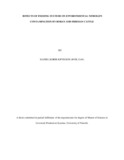| dc.description.abstract | Ruminants have long been known to be less efficient in utilizing nitrogen (N) when fed on high protein diets and decreasing these dietary levels supplied has been proposed as one way of significantly improving N economy in cattle. However ruminants in tropical, developing economies are typically fed diets that are generally low in protein especially during the dry season. A study was conducted using two breeds of yearling steers namely Boran and Friesian (n=12; LW: 161.8 ±10.89 kg) in a duplicated 3×3 Latin square to evaluate the effects of protein supplementation and supplementation frequency on DM intake, digestibility, nitrogen retention and microbial nitrogen supply in cattle consuming low protein basal diets. The steers were maintained on ad libitum chaffed wheat straw (DM: 877.3 ± 5.2 g/kg CP: 20.0±1.10 g/kg), with supplemental protein supplied as air dried Calliandra calothyrsus leaves (DM: 897.3 ± 3.06 g/kg, CP: 257.5± 4.04 g/kg on DM basis). The treatments were: basal diet alone, Calliandra supplemented every day at 0.2% LW kg and Calliandra supplemented every other day at 0.4% LW. Animals were fed once every day at 0930 hr with the supplement provided in separate buckets. Samples of basal diet, supplement, refusals, faecal matter and urine were collected and analyzed.
Supplementation increased DMI of the steers by 16.4 % and 20.0% for daily and alternate day supplementation respectively, but only crude protein apparent digestibility increased with supplementation Microbial nitrogen flow also increased with supplementation (P<0.001) but also daily supplementation had significantly higher (P<0.001) flow than alternate day supplementation (2.24 vs 0.18 g N/100kg.d). Steers lost body weight on all treatments but significantly (P<0.05) less when supplemented. Increased nitrogen retention (P<0.001) was observed with supplementation compared to control (-33.3% vs 15.7%, SEM 0.055). The increased N balance in animals receiving
xiv
supplemented diets indicates that N retention improves with increased protein supplementation in animals fed low-protein basal diets, implying that improving protein supply to animals fed sub-maintenance diets will not only ameriolate production losses in cattle, but also decrease environmental N losses. | en_US |



